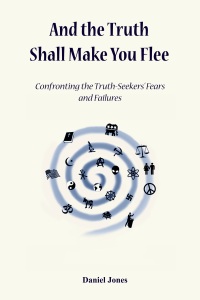Hi all,
Yesterday I published my small book on the nature of belief…
Here is the Introduction:
Col. Jessep: You want answers?
Kaffee: I think I’m entitled to them.
Col. Jessep: You want answers?
Kaffee: I want the truth!
Col. Jessep: You can’t handle the truth!
— A Few Good Men
Jack Nicholson’s famous line isn’t a dodge; he sincerely means it. Col. Jessep lives in a world of violence and threats wholly alien to Kaffee’s insulated, spoiled one.
“You don’t want the truth because deep down in places you don’t talk about at parties, you want me on that wall, you need me on that wall. We use words like honor, code, loyalty. We use these words as the backbone of a life spent defending something. You use them as a punchline.”
Jessep is the bad guy of the movie, but his indictment is valid—sometimes we simply cannot handle the truth, or we at least behave as if we can’t.
Aristotle said, “All men by nature desire to know,” to which I must add, “Unless it hurts.”
And Pascal wrote, “People almost invariably arrive at their beliefs not on the basis of proof but on the basis of what they find attractive.”* When I was young, I believed that Pascal could be disproven. I believed in the power of objective reason, that logic and philosophy could easily overcome our mere wants. What I believed in my youthful naïveté is generally true…provided that the gains quickly and heavily outweigh the costs. But once a conflicting belief becomes expensive—when it brings us pain, loss, fear, or chagrin, then the entire truth-searching game changes. At that point, we do steer our ships in the direction of our desires.
In spite of our need for the truth, we find ways of avoiding it, sometimes by simply closing our eyes and walking away. But more often, it’s by convincing ourselves that we’ve investigated when in fact we’ve done nothing of the sort.
[* On the Art of Persuasion, 1658.]
I’ve spent the majority of my life in a search for the truth about God and religion. Through the years of reading, arguing, musing, and observing others in these debates, I’ve seen people (on both sides) steer themselves, sometimes knowingly, sometimes blindly, in the direction of their preferred destination. I’m guilty of it too.
More importantly, I saw that debaters in other heavy topics—philosophy, politics, ethics, etc.—did the same thing. People on all sides of big debates function, at least in large part, quite similarly (prizing reason, evidence, honesty), but still consistently land on very different conclusions. How is it that some evidence and arguments feel so strong, so convincing, to one group, yet so weak to another? How can reasonable, intelligent people so profoundly disagree about these important issues? Are we so weak and blind that we conflate what we want for what is?
Something is in our way, and it’s deep inside our core being, in the corners of our minds where we tend to never visit. This book was written to uncover the truth of our truth-aversion, to explore the intellectual and existential barriers and pitfalls that prevent us from clearly seeing and earnestly seeking the truth when we’re threatened with pain and loss, and to develop tools and strategies to counter our fallibility.
I’d love to hear reactions/reflections.
If you’d like a free Kindle version, just email me at truthshallmakeyouflee@gmail.com
Daniel
